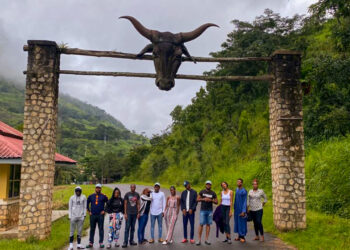The managing director/CEO of Norrenberger Asset Management Limited (NAML), Pabina Yinkere, has urged Nigerians to put their idle funds to use by investing in mutual funds listed on the Nigerian Exchange.
Yinkere stated this during the listing of two mutual funds on the exchange on Wednesday.
The asset management company had listed two of its mutual funds, the Norrenberger Islamic Fund and the Norrenberger Turbo Fund, which brings the number of listed mutual funds on the exchange to 63 and the ethical funds to five.
Yinkere noted that, with inflation at over 30 per cent, funds should not be left idle but invested in capital market instruments such as mutual funds which are not only safe haven but also yeild higher returns.
Stating that, the goal at Norrenberger is to democratise investment, he said, “We make it part of our mission and our mandate to ensure that there is one Norrenberger product in every household in Nigeria. That is the vision that drives us as an organisation. To democratise investments in the country and be able to get valuable products to retail investors.
“Thus we have thought it important to make products available at transparent and efficient platform such as the NGX And it is in that vision that this listing of our mutual funds. Today, we are listing two mutual funds, the Norrenberger Islamic Fund, and the Norrenberger Turbo Fund, which is a Fixed Income Fund. The feature of the fund is that the retail investors are able to get quarterly distributions compared to the annual distribution that other funds do,”Yinkere stated.
On his part, the chief executive of the NGX, Jude Chiemeka, stressed the need for more instruments that retail investors can access on the exchange. Commending Norrenberger on the listing of the two mutual funds, he said, “the inclusion of the mutual funds is critical to the growing instruments that investors can trade. GIven where inflation is and also where the MPR is, it becomes really important for retail investors to have access to professionally managed instruments, to be able to get the most of their investment. But beyond that, it also helps to democratize opportunities that are available, given the fact that you don’t really need to have a large amount of capital to start investing through the mutual fund.”
Noting the impact of ethical funds in the country, Chiemeka said, asides bringing liquidity and creating additional instruments in the market, over N1 trillion had been raised to fund various projects that are evident in the country. It is important for retail investors to seek where to put their funds. Retail investors should begin to use mutual funds to access the market.
“Islamic finance is one of the critical areas that the exchange takes pride in. We have MoUs across different markets, and one of the underlining considerations is how we can deepen Islamic markets. We are in partnership Islamic Development Bank just trying to train a lot of corporates around how they can utilize that instrument to be able to meet their funding needs.
“Obviously, the requirements around Sharia compliance type of involvement sometimes creates a bit of challenge for some of the issuers, but we believe that now that you have done it, it only makes it possible for a lot more asset managers to begin to create instruments around Islamic Finance. We do need to have a lot of supply, because, as you know, the demand is there, but there is never enough supply,” he pointed out.
Also speaking at the listing, Group Chief Financial Officer of Norrenberger, Mrs Queen Ehi-uujahman, noted that, expanding the financial landscape to be more inclusive is very essential for economic development for the country.
Poor Connectivity: Experts Advocate Investment in Switching, Transmission Infrastructure
BY ROYAL IBEH8
Experts in the Information and Communication Technology (ICT) sector have advised Nigeria and other African countries to invest more in providing locally hosted switching and transmission digital infrastructure for strong internet connectivity.
The experts, comprising of the managing director/CEO of Luli, Olufemi Imoleayo Adeyeye; Managing Director, Cedarview Communication Limited, Olawale Owoeye and the CEO, TelCables Nigeria and West Africa, Fernando Fernandes, while speaking at Nigerian Peering and Interconnection Forum, in GRA, Ikeja, Lagos recently, noted that, the reason for low Interconnected cables in Africa, is that, not all cables (subsea and terrestrial cables) are interconnected.
“So, when cable faults or breakages occur, it can impact connectivity in different ways. When breakages do occur, they said, networks can be affected for a few hours or days before the internet traffic is rerouted.
“When it comes to cable breaks and rerouting of traffic, there is more diversity of routes on the East Coast, which means that for example, despite the disruption of the three cables in the Red Sea, it was possible to diversify traffic through international cables running through Djibouti,” the pointed out.
To address these challenges, they noted that, Nigeria must invest more in providing locally hosted switching and transmission digital infrastructure to cater to transactions within the country, even as local transactions should remain local to reduce dependency on international connections and minimise disruptions, saying, the recent fiber cuts revealed significant inefficiencies in Nigeria’s technology solutions.
On his part, the CEO, TelCables Nigeria and West Africa, Fernando Fernandes, urged Nigeria to improve Africa’s internet reliability and resilience during cable cuts by hosting content locally, educating regulators and policymakers on the importance of cross-border interconnectivity, and investing in internet infrastructure.
On building resilience and promoting collaboration in the subsea cable market, he said, recent events in the Red Sea and off the West Coast of Africa have once again highlighted the vulnerability of subsea cable infrastructure. Cable faults, whether caused by natural disasters or human activities, he said, pose significant threats to international communication networks.
“It is imperative for system owners to understand and address the need for enhanced resilience in subsea cable systems to mitigate the impact of such disruptions on their users. The reliance on undersea cables can, however, present major risks related to important public interests and have national and economic security implications. Protecting the security, resilience, and integrity of undersea cables is critical to global communications, economic growth, and development.
“Managing security risks, including from high-risk suppliers of undersea cable equipment and promoting best security practices for laying and maintaining these cables for secure and resilient global infrastructure is essential for the networks upon which the global economy relies,” he emphasised.
Undersea cable infrastructure,he said, includes not only the communication cables themselves but also any elements related to their construction, operation, surveillance, maintenance and repair, such as landing stations, software, and the terrestrial parts of the submarine cable connecting to them, repair centers, as well as the fleet of deployment, maintenance and repair vessels.
Hence, he said, the major subsea cable operators should design undersea cable infrastructure and services with resilience, redundancy, and security in mind, advising them, to build and maintain this infrastructure incorporating cybersecurity best practices that safely facilitate international communication.





